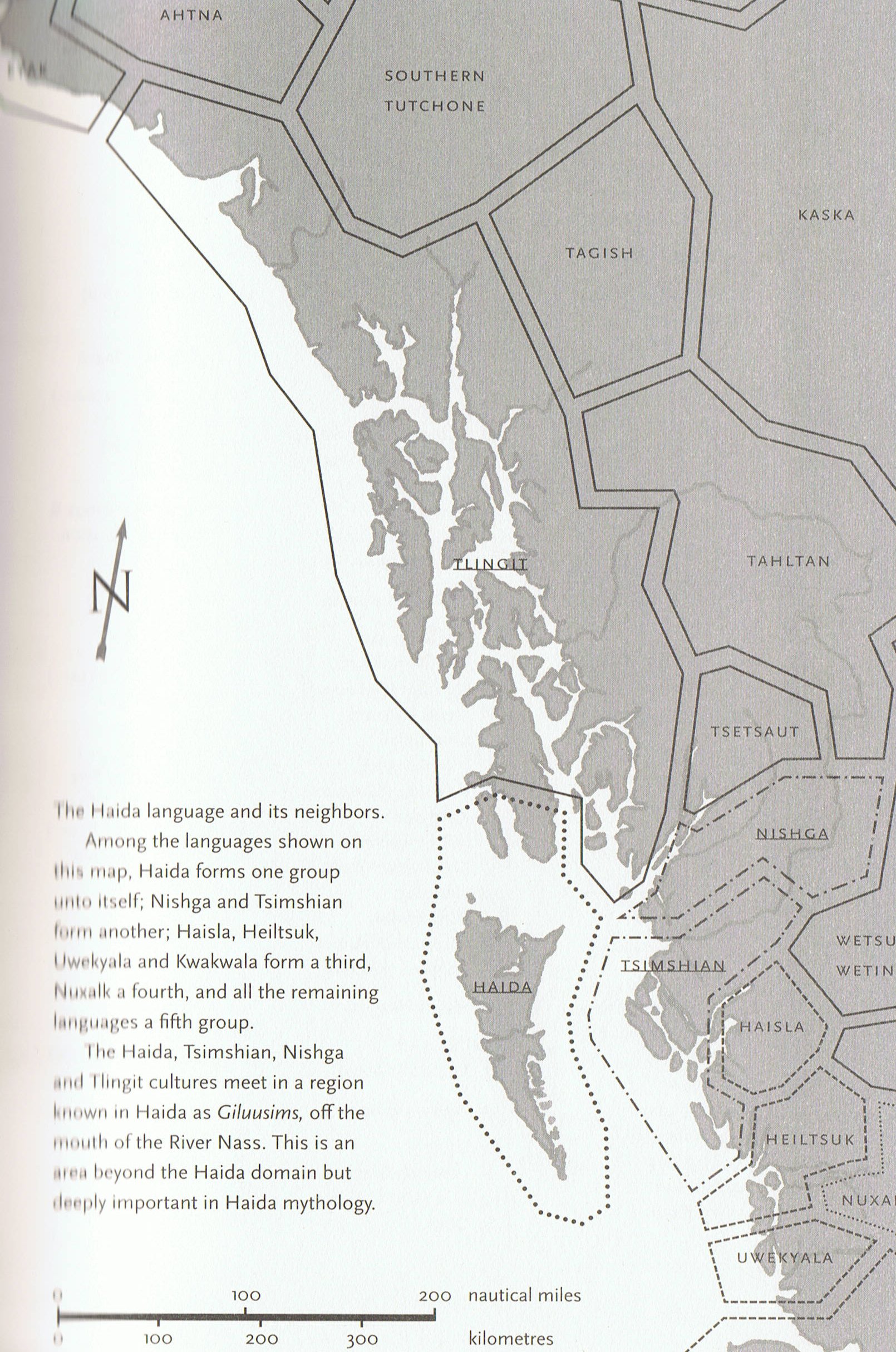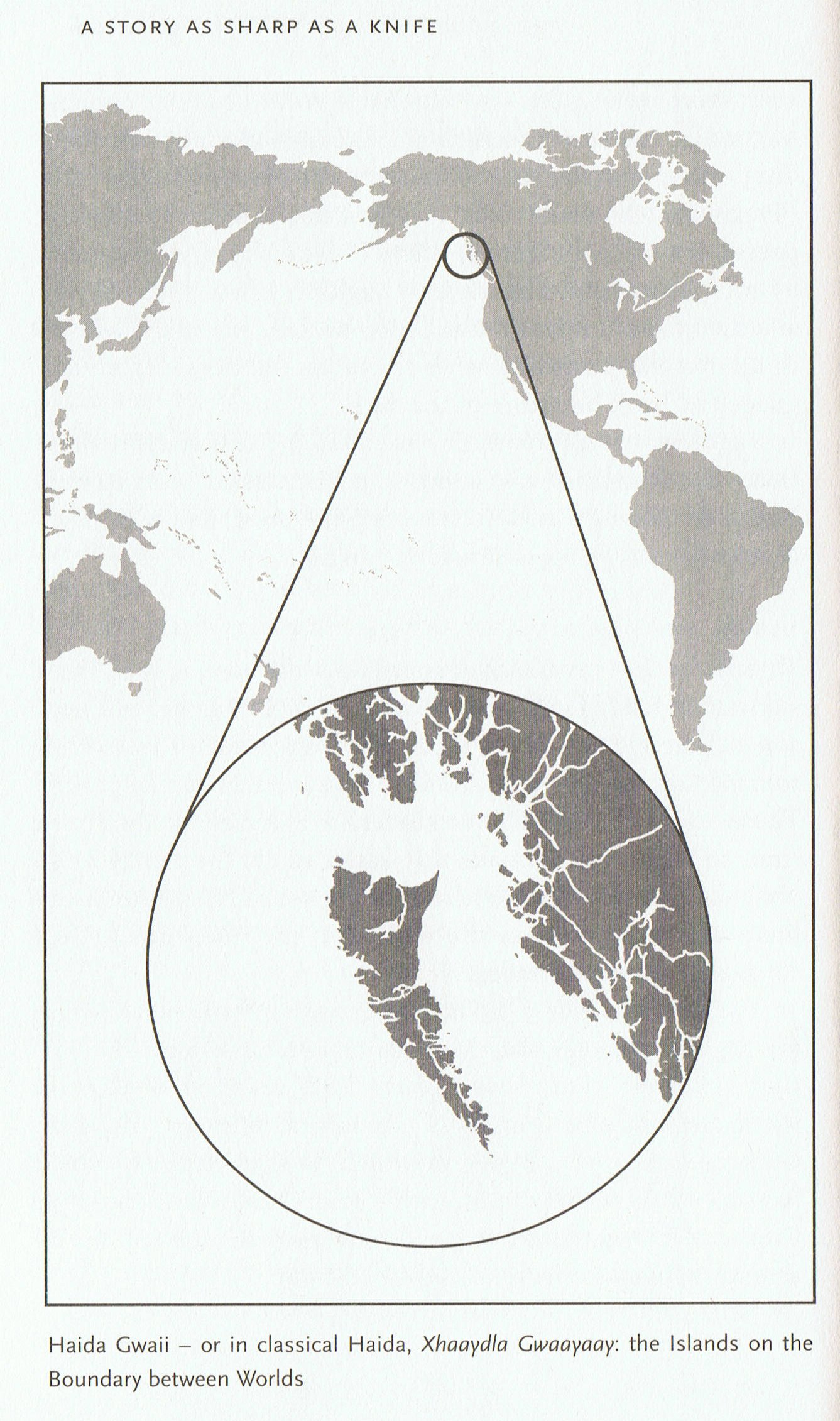|
TRANSLATIONS
Women are giving
birth and men
are killing,
strange then
that vai
means birth
(light) and
hua poporo
death (shadow).
The sweet
rainwater (vai)
from heaven is
coming from
above, the male
(vertical)
domain, while
the salt water
in the ocean (tai)
is lower down
than the pools
of rain water in the land
raised up by
Maui.
Life originates
in the sea and
the tidal beach
is henua,
I imagine -
he-nua (-
hine), the
old woman.
The land side (uta)
needs water from
the sky, while
the tidal zone
is
self-sufficient.
Heyerdahl
pointed to the
Northwest Coast
indians as the
probable origin
of those who
emigrated to
Hawaii:
|
...
The
great
'wandering
chief'
who
is
said
to
have
discovered
the
Hawaiian
islands
is
alluded
to
as
Hawaii-loa,
or 'Hawaii-the-great',
(but
his
name
is
also
repeatedly
given
as
Ke
Kowa-o-Hawaii,
or
'The
Straits
of
Hawaii'.
(Fornander
1878,
Vol.
I,
p.
23,
25.)
The
island
Hawaii
was
named
after
this
mythical
wanderer,
and
hence
the
name
must
be a
very
ancient
one
brought
to
Hawaii
by
its
early
settlers.
Fornander
himself
was
sufficiently
familiar
with
the
Polynesian
predilection
for
allegories
and
symbolic
names
to
realize
that
'the
Straits
of
Hawaii'
was
merely
a
poetical
device,
a
descriptive
mythical
name
personified
in
the
local
discoverer,
and
he
proceeded
to
trace
its
possible
origin.
He
and
others
have
shown
that
Hawaii,
alias
Hawaiki,
is a
composite
name,
consisting
of a
root
with
the
suffix
ii,
alias
iki.
Iki
is
the
original
form,
and
ii
the
result
of a
later
dropping
of
the
letter
k.
Philologists
have
suggested
two
possible
meanings
for
this
suffix;
on
one
hand
'small'
or
'little';
on
the
other
'furious'
or
'raging'
as
referring
to a
volcano
in
eruption.
The
improbability
of
the
first
of
these
meanings
is
apparent
from
the
old
Polynesian
use
of
words
like
Hawaii-loa
and
Hawaii-nui,
which
would
produce
the
senseless
suffix
'Little-Great'.
And,
as
shown
by
Fornander
(Ibid.,
p.
6),
a
Marquesan
tradition
shows
plainly
that
ii
refers
to a
volcano:
'...
in a
chant
of
that
people,
referring
to
the
wanderings
of
their
forefathers,
and
giving
a
description
of
that
special
Hawaii
on
which
they
once
dwelt,
it
is
mentioned
as
Tai
mamao,
uta
oa
tu
te
Ii
- a
distant
sea
(or
far
off
region),
away
inland
stands
the
volcano
(the
furious,
the
raging).'
According
to
Henry
(1928,
p.
115),
also
Tahitian
folklore
often
spoke
of
Hawaii
Island
as
Havai'i-a,
or
'Burning
Havai'i',
due
to
its
volcano
which
was
formerly
always
brightly
burning.
Thereupon
Fornander
and
others
with
him
removed
the
epithet
ii
or
iki,
and
looked
to
the
west
for
a
place-name
equivalent
to
Hawa
(of
Hawaii),
Sava
(of
Savaii),
or
Hapa
(of
Hapaii).
Suspicion
naturally
fell
on
Java,
and
the
name
of
this
island
was
by
many
considered
the
clue
to
the
'whence'
of
the
Maori-Polynesian
ancestors.
After
jumping
a
good
6,000
miles
from
Hawii
to
Java,
he
then
took
a
further
leap
of
5,000
miles
back
to
Zaba,
the
early
seat
of
Cushite
empire
in
Arabia,
as
the
ancestral
starting
point.
However,
finding
nowhere
any
'Strait'
with
a
name
equivalent
to
Hawa
or
Hawaii,
Fornander
(p.
25)
simply
suggests
that
the
allegoric
reference
to
the
Hawaiian
discoverer
as
'the
Straits
of
Hawaii'
must
refer
to
the
Hawaiian
memory
of a
now
lost
name
for
the
Straits
of
Sunda
between
Java
and
Sumatra.
Here
the
question
was
left.
Taking
up
Fornander's
original
clue,
the
present
author
suspected
that
Hawai
(or
Savai,
Hapai)
might
have
been
the
old
root
from
which
the
name
sprang,
rather
than
Hawa.
As
stated
earlier,
Whatonga's
legendary
canoe
in
Hawaiki
was
named
Te
Hawai,
not
Te
Hawa
nor
Te
Hawaiki;
and
in
Hawaii
ancient
place-names
like
Kaha-hawai,
Puna-hawai,
etc.
are
found.
Even
more
suggestive
is
the
fact
that,
as
stated,
the
epithet
ii
or
iki
refers
to a
raging,
active
volcano,
of
which
there
are
none
in
Polynesia
outside
the
Hawaiian
and
Samoan
groups
and
New
Zealand.
There
are
two
in
Hawaii
in
the
Hawaiian
Group,
and
another
in
Savaii,
but
there
is
none
in
Hapai
in
the
Tonga
Islands.
Therefore,
Hawaii
and
Savaii,
but
not
Hapai,
have
been
given
the
suffix
ii,
denoting
a
volcano.
Yet,
even
without
the
ii,
this
Tonga
island
is
known
as
Hapai
and
not
as
Hapa,
quite
in
keeping
with
the
name
of
Whatonga's
canoe
Te
Hawai
from
Hawaiki.
The
reduction
of a
consonant,
changing
Hawaiki
to
Hawai'i
and
Hapaiki
to
Hapai'i,
is a
well
known
process
in
Polynesian
speech,
but
no
Polynesian
dialect
would
abbreviate
Hapai'i
to
Hapai.
On
the
other
hand,
Hapai
may
very
well
be
the
root
of
Hapai-iki,
and
the
canoe
Te
Hawai
may
be
the
root
of
Te
Hawai-iki.
Recalling
at
the
same
time
the
marked
softening
tendency
throughout
Polynesian
speech,
the
p
in
Hapai
is
obviously
an
older
form
than
w
in
Hawai.
On
these
premises
I
resumed
the
search
outside
Polynesia
for
Hapai,
or
even
for
the
more
guttural
Hakai.
In a
general
world
atlas
(Philip
1934,
p.
191)
I
checked
up
on
the
principal
straits
between
the
islands
in
the
Northwest
American
Archipelago,
and,
between
the
Hunter
and
Calvert
Islands,
right
in
the
midst
of
the
Kwakiutl
territory,
was
the
Hakai
Strait.
If
Hakai
had
been,
for
instance,
in
Europe
or
Argentina,
or
if
it
had
been
a
mountain-ridge
or
an
island,
instead
of a
principal
strait
among
the
Northwest
Indians
of
the
particular
Kwakiutl
tribe,
then
it
might
well
have
been
attributed
to
simple
coincidence.
But
if
we
are
actually
looking
for
a
certain
strait
with
a
certain
name,
located
between
the
limited
number
of
islands
in
Kwakiutl
territory,
and
we
actually
find
it
there,
that
it
be
coincidence
can
no
longer
be
considered
... |
|
...
There
are
still
traces
to-day
of
some
ancient
habitation
on
the
coast
of
the
Hakai
Strait,
although
in
historic
times
it
has
only
served
the
surrounding
tribes
as a
dependable
fishing-ground
and
source
of
food.
It
may
be
worth
while
to
note
that
in
the
dialect
of
the
Marquesan
islanders
hakai
means
'to
feed'.
In
Easter
Island
the
word
reappears
as
hagai,
which
means
'to
feed,
to
nourish';
and
at
Mangareva
as
agai,
'to
give
food
to'.
In
the
Marquesas
kai
and
kai-kai
means
to
'eat';
and
on
the
Northwest
Coast
kaik
(Tsimsyan)
and
ka-aia
(Tlingit)
means
'belly';
and
ka-ta
(Haida)
means
to
'eat'.
We
have
ample
reason
to
suspect
that
the
particular
Hawai
or
Hapai
Strait
alluded
to
in
the
symbolic
name
of
the
Hawaiian
discoverer
is
the
Hakai
Strait,
the
direct
geographical
link
between
the
tribes
driven
away
from
prehistoric
Bella
Coola
and
those
driven
ashore
in
prehistoric
Hawaii.
It
is
well
worth
noticing
that
in
historic
times
it
is
among
the
surrounding
Kwakiutl
and
not
among
the
Bella
Coola
intruders,
that
we
find
the
main
bulk
of
Maori-Polynesian
analogies;
also
that
the
Kwakiutl,
according
to
Drucker's
survey,
represent
the
purest
-
and
together
with
the
Nootka
perhaps
also
the
oldest
-
aboriginal
coast-dwellers
in
the
present
Northwest
Indian
habitat
... |
I borrowed A
Story as Sharp
as a Knife
from the library
in order to see
if there are
any connections
among the ideas
of the Haida
indians and what
slowly seems to
be
emerging from
the
rongorongo
texts.

The indigenous
name for Queen
Charlotte Island
- where the
Haida indians
live - is
Haida Gwaii,
a name sounding
suspiciously
similar to
Hawaii:
Hawaii -
Ha(-idag)waii
Yet, the Haida
language is
totally
different from
Polynesian,
example:
|
Aanishaw
tangagyanggang,
wansuuga. |
Hereabouts
was
all
saltwater,
they
say. |
|
Li
xitgwaangas,
Xhuuya
aa. |
He
was
flying
all
around,
the
Raven
was, |
|
Tigu
qqawgashlingaay
gi
lla
quaangas. |
looking
for
land
that
he
could
stand
on. |
|
Qawdihaw
gwaay
ghutgwa
nang
qaadla
qqaayghudyas, |
After
a
time,
at
the
toe
of
the
Islands,
there
was
one
rock
awash. |
|
llagu
qqawghaayghan
llagha
lla
xiidas. |
He
flew
there
to
sit. |
| |
|
Aa
ttl
sghaana
quiidas
yasgagas
ghiinuusis
gangaang |
Like
sea-cucumbers,
gods
lay
across
it, |
|
llagu
gutgwii
xhihldagahldiyaagas. |
putting
their
mouths
against
it
side
by
side. |
|
Ga
sghaanagwaay
ghaaxas
lla
ttista
qqaa
sqqagilaangas, |
The
newborn
gods
were
sleeping,
out
along
the
reef, |
|
ttl
gwiixhang
xhahlgwii
at
wagwii
aa. |
heads
and
tails
in
all
directions. |
|
Ghaadagas
gyaanhaw
ising
ghaalgagang,
wansuuga
... |
It
was
light
then,
and
it
turned
to
night,
they
say
... |
This is the
beginning of
the Poem
of the
Elders,
as recounted
by Skaay.
Searching
for words
which may be
related to
Polynesian
ones, I find
only one
such:
wansuuga
(they say)
which rings
similar to
vanaga.
|
Vánaga
To
speak,
to
talk,
to
pronounce;
conversation,
talk,
word,
language;
he
vânaga
i te
vânaga
rapanui,
to
speak
Rapanui;
vânaga
reoreo,
lies,
lying
words,
falsehoods.
Vanavanaga,
to
talk
at
length;
useless
talk.
Vanaga.
To
speak,
to
say,
to
chat,
to
discourse,
to
address,
to
recount,
to
reply,
to
divulge,
to
spread
a
rumor;
argument,
conversation,
formula,
harangue,
idiom,
locution,
verb,
word,
recital,
response,
speech;
vanaga
roroa,
chatterbox,
babbler;
rava
vanaga,
candid,
babbler;
tae
vanaga,
discreet;
tai
vanaga,
ripple;
vanagarua
(vanaga
-
rua
1),
echo.
P
Pau.:
vanaga,
to
warn
by
advice.
Mgv.:
vanaga,
orator,
noise,
hubbub,
tumult.
Mq.:
vanaa,
orator,
discourse,
counsel,
advice.
Churchill. |
Although
Heyerdahl
searched for
a strait
(because of
the name of
'the
wandering
chief'
Ke
Kowa-o-Hawaii,
The
Straits of
Hawaii), I
think it
would be
more true to
search for
an island,
and Queen
Charlotte
Island is a
natural and
good
candidate.

Haida
Gwaii
means (among
other things
I suppose)
'the Islands
on the
Boundary
between
Worlds' (Xhaaydla
Gwaayaay).
The worlds could
be America
and
Polynesia,
but other
meanings are
equally
possible,
for instance
land and
sea.
Rocks
awash in salt water
was
nourishing
sea-cucumbers,
the newborn
godlings.
This was
before light
and
darkness, in
the misty
beginnings.
"It is a
peculiarity
- or a
pathology,
perhaps - of
centrally
administered
and
urbanized
societies to
want to see
the world,
including
the gods, in
strictly
human terms,
or to see it
still more
narrowly, in
terms of a
single
language,
faith and
culture.
Industrial
societies
habitually
go further,
dropping the
gods
overboard
and
classifying
all nonhuman
beings - and
often other
human beings
too - as
'natural
resources'
waiting to
be used.
In classical
Haida
literature
and art,
humans never
exercise
such
dominance.
The ritual
combat of
man against
man, man
against
nature, and
man against
himself
- reputedly
the
elemental
themes of
modern
European
literature -
are never
more than
secondary
subject
matter here.
Classical
Haida poets
spend much
more time
exploring
the
connections
between
humans and
nonhumans -
sea mammals,
land
mammals,
fish, birds,
and the
sghaana
qiidas,
'those who
are born as
spirit
powers', the
gods.
Skaay and
Ghandl speak
of three
distinct
realms -
forest, sea
and sky -
each with
its native
populations.
None of
these,
however, is
the human
realm.
Humans are
only at home
on the
xhaaydla,
the boundary
or
intertidal
zone, at the
conjunction
of all
three. A few
strokes of
the paddle
or a few
steps into
the bush are
enough to
leave the
human world
behind."
(Sharp as a
Knife)
Skaay refers
to Raven's
mother as
'Floodtide
Woman'.
|

